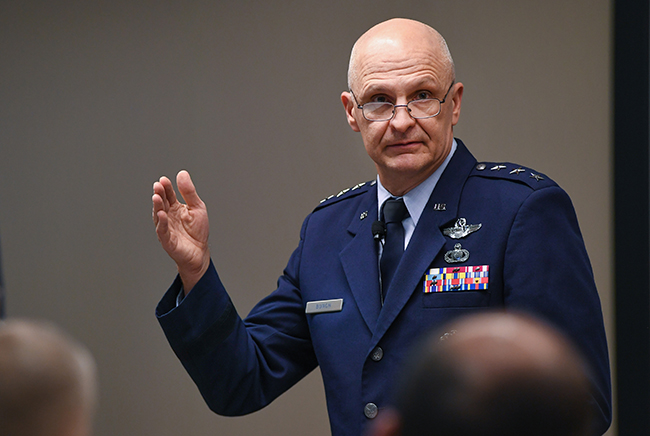
Then-Lt. Gen. Arnold Bunch speaks to attendees during an Air Force Association Counter-small UAS Symposium at the MITRE Corp., in Bedford, Mass., on Sept 26, 2018. Air Force photo by Todd Maki.
Boeing’s cluster of big contract wins last year, which came in billions below Air Force estimates, may soon signal that USAF will have to change its cost estimating system, Gen. Arnold Bunch, head of Air Force Materiel Command, said in an exit interview from his post as top uniformed acquisition official.
Former Air Force Secretary Heather Wilson characterized Boeing’s win on the T-X advanced trainer as coming in at $10 billion below what USAF thought the program was worth, and the UH-1N replacement helicopter program at $1.7 billion below USAF’s estimate. Boeing also won the Navy’s MQ-25 carrier-based refueling drone contract last fall at a bid below the Navy’s estimates.
“Our independent cost estimates are based off historical performance in a lot of areas,” Bunch said, and it will be up to the acquisition shop to assess how it performed in creating those estimates. But before changing methods, it will be necessary to see if those bids are borne out, Bunch said. “You’ve got to see the performance, you’ve got to execute to it before you’d decide that’s how we’re going to do it” in the future.
It’s also important to note that there’s no single way to assess programs. “If you’ve managed one program, you’ve managed one program,” noted Bunch, who recently assumed command of Air Force Materiel Command. “Every one of them is different. But I do believe we’re going to have to look and refine our cost estimating …as we get more data on how these perform.”
Bunch also said better cost estimating is needed because if the Air Force sets aside too many dollars for a program, and the project comes in way under estimates, the savings are great but “maybe I could have used those dollars somewhere else,” and it’s a missed opportunity to fund another priority.
“I’ll tell you what that really does, though,” Bunch asserted. “This round of what we’ve done just shows you the true value of competition.”
What if Boeing’s promises don’t hold up, though? It has lost more than $3.5 billion on the KC-46, which was expected to be a straightforward project with no dramatic innovations required.
Bunch said he strongly endorses the views of former Pentagon acquisition, technology, and logistics czar Frank Kendall, who argued that acquisition pros need to be discerning about when and when not to use a fixed-price contract, such as was used on the KC-46. Kendall argued that fixed-price is only appropriate when the project is extremely well understood, whereas cost-plus should be used when there’s a lot of invention demanded.
There are several factors that should be considered when setting up source selection criteria, including “how we communicate with industry,” how realistic the expectations are and whether or not “we perform,” as well as the technical risk, maturity of the technology, and whether or not there is a possibility of a foreign military sale, Bunch said.
On the KC-46, “we’ve been pretty firm that we’ve not backed away, we’ve not changed the requirements,” Bunch asserted. “Boeing has been a good partner and they realize there are things …that they’ve got to do that they signed up for.” On the other hand, he said, “on the boom, where we gave the wrong requirements…we’ve owned up that we did something we need to go pay for…That’s ours.”